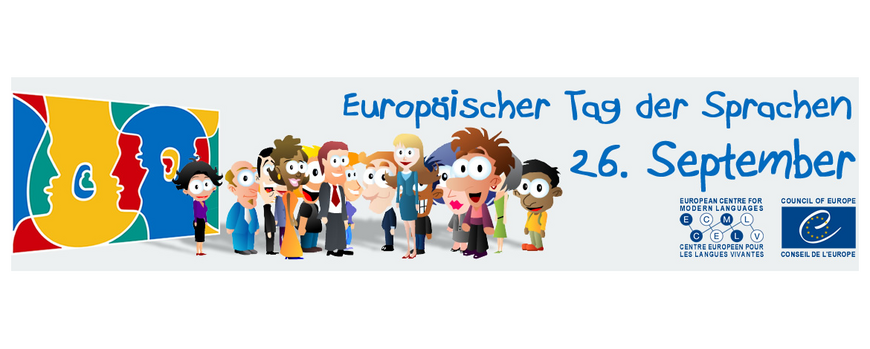September 26--The European Day of Languages: Multilingualism and Social Justice at European Universities
The European Day of Languages takes place on September 26. David Prickett, Head of the Center for Languages and Key Competences (Zessko), highlights its significance for the European Digital UniverCity (EDUC) alliance, emphasizing how promoting multilingualism strengthens shared university values such as cooperation, inclusion, and diversity. Through fostering linguistic diversity, this day supports EDUC’s mission to enhance intercultural dialogue and empower students across European campuses to engage with a more connected and inclusive society.
What is the importance of multilingualism on European campuses, particularly in relation to the European Day of Languages?
Prickett: The Council of Europe will celebrate the 2024 European Day of Languageswith the theme “Languages for Peace,” emphasizing how linguistic diversity and education can foster peace, coexistence, and democracy. Multilingualism is integral to the identity of European universities, and is essential for fostering cultural understanding and academic cooperation. On our campuses, language diversity enriches the educational experience by exposing students and staff to different ways of thinking and communicating. The European Day of Languages is a therefore a key opportunity to highlight these benefits, emphasizing not just linguistic variety, but also shared values such as inclusivity, openness, and respect.
Within the European Digital UniverCity (EDUC) alliance, centers for languages and key competences actively promote multilingualism as a way to enhance (virtual) mobility, cooperation, and cultural exchange. The European Day of Languages serves as a reminder of how important language skills are, not only for academic success but for creating a more interconnected and inclusive Europe.
How does the promotion of multilingualism intersect with social justice efforts, particularly regarding vulnerable communities?
Prickett: This intersection is becoming increasingly relevant. Masaryk University’s Language Center (Centrum jazykového vzdělávání, CJV MU, Czech Republic) has been exploring the role of language centers in supporting vulnerable communities, including indigenous populations and war refugees.
They have also taken several steps to use language education as a tool for inclusion. For example, they offer Swahili courses as part of a broader effort to draw attention to less commonly taught languages. And they have played a crucial role in helping Ukrainian refugees integrate into the Czech-speaking academic programs following the 2022 crisis.
Additionally, through the ESPULA project, Masaryk University’s Language Center is using a combination of language education, technology, and cultural heritage preservation to empower indigenous communities in Ecuador and El Salvador. This project not only enhances educational opportunities for these communities but does so in an environmentally sustainable way. It demonstrates how language centers can contribute to broader social justice initiatives beyond traditional educational boundaries.
How have language centers in the EDUC alliance been supporting minoritized communities, for example, concerning public health information disparities?
Prickett: The Nottingham Institute of Languages and Intercultural Communication (NILIC; Nottingham Trent University) has been focusing on this critical issue, particularly in the context of the Midlands region in England. Their work centers on removing language barriers that prevent minoritized communities from accessing vital public health information. The COVID-19 pandemic revealed serious gaps in communication with non-English speaking communities, and their research has highlighted the need for better language support in public health settings.
They have been leading efforts to train community members and non-professional interpreters in translation techniques, which helps ensure that important information reaches those who need it most. This kind of community-engaged research and teaching strengthens the connection between universities and society, making it a win-win for both academic programs and local communities.
Moreover, the team at NILIC is developing service learning initiatives that allow students to apply their language and translation skills in real-world contexts. This approach not only benefits the students but also provides essential support to minoritized communities, aligning with the broader goals of social justice.
How do Zessko’s collaborations embody the goals of this year's European Day of Languages?
Prickett: Zessko promotes language diversity through EDUC and other international partnerships. With joint video assignments, the "Russian Language Olympics" with the University of Gdańsk has enabled students to practice Russian and exchange cultural insights. Our participation in an AI workshop at the University of Lorraine has enhanced our understanding of the use of AI in language teaching at other European institutions. Additionally, Zessko’s collaboration with the Escuela Superior Politécnica del Litoral (ESPOL, Ecuador) focuses on international learning and future COIL projects, reflecting a commitment to inclusivity and social justice through language education.
Zessko is responsible not only for the language courses in the Refugee Teachers Program, but also for the Studienvorbereitung Brandenburg ("Study Preparation Brandenburg") and the DSH+ course for prospective students. Additionally, the student project Pangea supports the linguistic and cultural integration of refugees in Potsdam and the surrounding areas, fostering intercultural dialogue between refugees and non-refugees.
Multilingualism is indeed a tool for social inclusion and justice at language centers at European universities and beyond. It will be exciting to see these efforts develop further.
Contact: David James Prickett
Published on September 25, 2024

